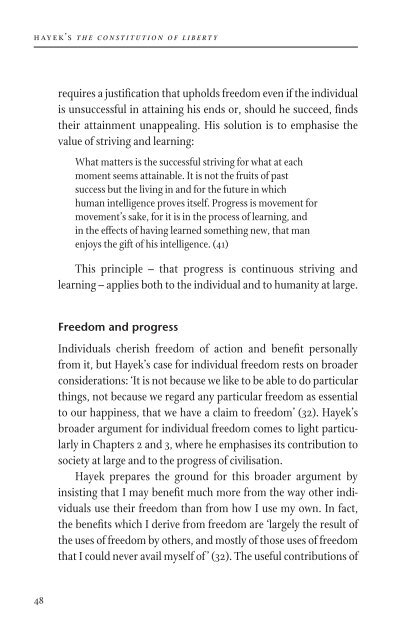Hayek's The Constitution of Liberty - Institute of Economic Affairs
Hayek's The Constitution of Liberty - Institute of Economic Affairs
Hayek's The Constitution of Liberty - Institute of Economic Affairs
You also want an ePaper? Increase the reach of your titles
YUMPU automatically turns print PDFs into web optimized ePapers that Google loves.
h ay e k ’ s t h e c o n s t i t u t i o n o f l i b e r t y<br />
i n d i v i d ua l f r e e d o m , c o e r c i o n a n d p r o g r e s s<br />
requires a justification that upholds freedom even if the individual<br />
is unsuccessful in attaining his ends or, should he succeed, finds<br />
their attainment unappealing. His solution is to emphasise the<br />
value <strong>of</strong> striving and learning:<br />
What matters is the successful striving for what at each<br />
moment seems attainable. It is not the fruits <strong>of</strong> past<br />
success but the living in and for the future in which<br />
human intelligence proves itself. Progress is movement for<br />
movement’s sake, for it is in the process <strong>of</strong> learning, and<br />
in the effects <strong>of</strong> having learned something new, that man<br />
enjoys the gift <strong>of</strong> his intelligence. (41)<br />
This principle – that progress is continuous striving and<br />
learning – applies both to the individual and to humanity at large.<br />
Freedom and progress<br />
Individuals cherish freedom <strong>of</strong> action and benefit personally<br />
from it, but Hayek’s case for individual freedom rests on broader<br />
considerations: ‘It is not because we like to be able to do particular<br />
things, not because we regard any particular freedom as essential<br />
to our happiness, that we have a claim to freedom’ (32). Hayek’s<br />
broader argument for individual freedom comes to light particularly<br />
in Chapters 2 and 3, where he emphasises its contribution to<br />
society at large and to the progress <strong>of</strong> civilisation.<br />
Hayek prepares the ground for this broader argument by<br />
insisting that I may benefit much more from the way other individuals<br />
use their freedom than from how I use my own. In fact,<br />
the benefits which I derive from freedom are ‘largely the result <strong>of</strong><br />
the uses <strong>of</strong> freedom by others, and mostly <strong>of</strong> those uses <strong>of</strong> freedom<br />
that I could never avail myself <strong>of</strong> ’ (32). <strong>The</strong> useful contributions <strong>of</strong><br />
even a few individuals can be <strong>of</strong> immense value to their contemporaries.<br />
Indeed, the freedom ‘that will be used by only one man<br />
in a million may be more important to society and more beneficial<br />
to the majority than any freedom that we all use’ (31). This result<br />
does not require disinterested or benevolent actions, although it<br />
may proceed from such motives. Typically the actor, in seeking to<br />
benefit himself, also benefits unknown persons without intending<br />
to do so or foreseeing this result.<br />
Hayek continues this argument by calling attention, as he<br />
<strong>of</strong>ten does, to our fundamental ignorance. I can never know which<br />
particular individuals will use their freedom so as to benefit me<br />
and the rest <strong>of</strong> society. Certainly I cannot identify in advance<br />
that ‘one man in a million’ whose contribution will be immense.<br />
Hayek describes freedom as ‘opportunity for the unknown few’<br />
(533). Only by extending freedom as broadly as possible can we<br />
provide an opportunity for these unknown benefactors to use<br />
their freedom effectively. Since no one has sufficient knowledge<br />
to pick and choose such individuals, freedom must be given to all.<br />
From here Hayek proceeds to show that individual freedom is<br />
essential to the long-term growth <strong>of</strong> civilisation and the advance<br />
<strong>of</strong> humanity at large. <strong>The</strong> progress <strong>of</strong> civilisation depends on<br />
man’s freedom to experiment with new ways <strong>of</strong> doing things. Here<br />
again, no one can predict in advance which ‘experiment in living’<br />
will move civilisation ahead. Progress cannot be designed: ‘it is<br />
not achieved by human reason striving by known means toward<br />
a fixed aim.’ Progress ‘always leads into the unknown.’ At most<br />
we can only expect ‘to gain an understanding <strong>of</strong> the kind <strong>of</strong> forces’<br />
that bring about undesigned growth and try to create conditions<br />
that are favourable to it (40).<br />
Earlier we took note <strong>of</strong> Hayek’s insistence that a free society is<br />
48<br />
49












